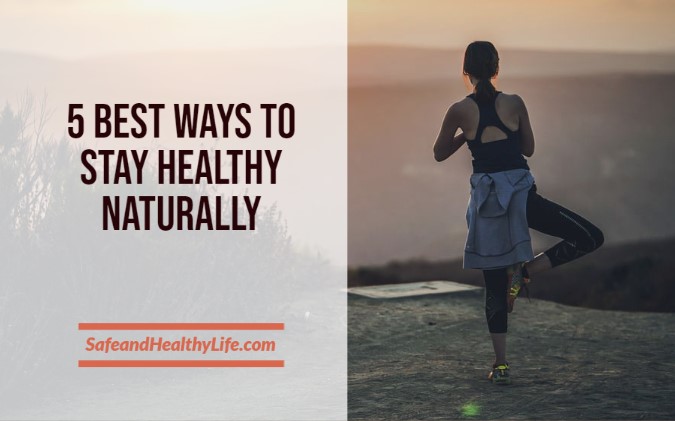
Prevention has always been recommended over any form of medical treatment in order to stay healthy.
Countries with large segments of the population suffering from preventable diseases like Type 2 diabetes, stroke, heart disease, and some forms of cancer tend to spend a big chunk of their funds on medicine and procedures to keep them healthy – funds that could’ve been used to prevent these diseases, rather than find a cure for them.
Fortunately, there are simple-yet-effective ways for you to maintain your health without breaking the bank. The best part is, you can even achieve this goal while reconnecting with Mother Nature.
Not convinced? Here are five of the best ways to stay healthy that have been proven countless times to be effective, both through testimonies and scientific findings:
1. Manage Your Stress
Stress is a killer. This statement is supported by science as many chronic ailments have been found to be affected, one way or another, by the stress hormone cortisol.
Plus, stress-induced emotions can also make you use up huge amounts of energy, leading to fatigue and weakness.
Luckily, there are easy ways you can manage stress effectively. You can try talking to a loved one or a friend to help you get it all out. You can also meet with a psychotherapist or join a support group to tackle the source of your stress more effectively.
Aside from talking, other activities that foster relaxation include:
- Meditation
- Yoga
- Self-hypnosis
- Tai chi
2. Exercise
Exercising is always a crucial part of maintaining overall health. Aside from boosting sleep quality, exercise can also energize your cells and improve oxygen circulation in the entire body. It can also trigger the release of hormones norepinephrine and epinephrine in modest amounts to increase your energy. These stress hormones have a big role to play in the body’s natural fight-or-flight response to sources of stress and other medical benefits.
Some easy exercise activities you can do are:
- Jogging or brisk walking
- Aerobics
- Dancing
- Swimming
3. Spend Time Outdoors
Exercising is best done outdoors. Aside from reducing stress levels, it can also help you sleep better and get exposed to the sun enough for your daily dose of Vitamin D. That said, a jog around the park makes you become healthier than running on a treadmill.
Of course, you can also choose to go to other places to exercise while getting closer to nature at the same time.
A trip to a wildlife sanctuary in Dubai, for example, will not only ensure that your body is fit but also offer you a chance to meet wild animals face-to-face. This will help you get a sound mind filled with compassion for animals that have been rescued and cared for within the grounds.
An International Journal of Environmental Research and Public Health review even took note of the empirical evidence that supports the benefits of interacting with nature. Below are some of the health advantages that nature can offer you, according to several studies:
- Improved Cognitive Function
Some studies have hypothesized the restorative effects of natural environments on a person. In fact, it was found that getting closer to nature alleviates mental fatigue and contributes to a person’s attentional recovery.
Researchers found evidence suggesting that interactions with nature outdoors – be it intentional or indirect – can help boost cognitive function. It is worth noting, however, that the effect is more ambiguous when it comes to surrounding indoor interactions.
- Physiological Benefits
Studies have repeatedly identified a wide range of physiological advantages connecting with nature can offer humans. Some of them noted that indoor plants placed inside work environments greatly improve worker health and lessen absences due to illness.
Another study in Taiwan uncovered evidence that even just a picture of natural scenery can help improve the physiological effects of stress in the workplace. If a picture can do that, just imagine what the actual thing would be able to give you.
4. Ensure You Get Adequate Sleep
Do you feel like you’ve been deprived of sleep? Experts from Harvard say you must try getting more sleep.
While this may sound counterproductive, doing so can help you determine the amount of sleep you need and reduce the time you spend lying down without getting a shuteye. Plus, this process can make falling asleep so much easier and even improve the restful quality of sleep in the long run.
Here are the steps on how to do it properly:
- Don’t take naps during the day.
- Hit the sack later than you normally would on the first night. During this time, you should only get four hours of sleep.
- If the quality of your sleep is better during the four-hour period set on the first night, you can add 15 to 30 minutes to your bedtime the next time.
- If this trend continues, gradually extend your sleeping time on the succeeding nights.
5. Eat Small-But-Frequent Energy-Refueling Snacks
You probably heard that eating small, frequent meals is a great way to lose weight. But did you know that experts recommend this to maintain your energy level throughout the day? This is because the body perceives that it is in a state of fatigue when the brain lacks the supply of nutrients at certain points of the day.
The key is to eat foods that have a low glycemic index or those which contain sugars that are slowly absorbed in the body. This will prevent the energy lag that usually happens when you consume simple sugars and refined starches that the body can break down quickly.
Some of the best low glycemic index foods you can try are:
- Whole grains
- Vegetables that are high in fiber
- Nuts
- Olive oil and other healthy oils
Also, it is worth noting that high-carbohydrate foods tend to have high glycemic indexes, so you must stick to fats and proteins which have almost zero glycemic indexes.
A Final Word
Connecting with nature has so many benefits, but the most significant one you probably need right now is those related to your health. Stay healthy naturally with the help of the tips mentioned in this article, and share the information with your friends.
About The Author:
Rasha El Saleh is the Conservation Education and Outreach Coordinator in the education team of Emirates Nature-WWF working on its program, Connect with Nature. She leads the outreach and youth empowerment aspect in growing the Connect with Nature community within the UAE and providing opportunities for youth to lead in this community, in addition to supporting partnerships with vendors supporting and promoting active aspects of the program.




